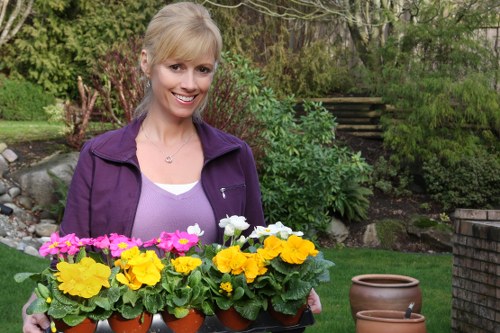Comprehensive Guide to Garden Maintenance in Morden
Introduction to Garden Maintenance

Maintaining a beautiful garden in Morden requires dedication, knowledge, and the right techniques. Whether you're a seasoned gardener or a beginner, understanding the essentials of garden maintenance can transform your outdoor space into a vibrant and thriving oasis.
Garden maintenance involves a variety of tasks, from regular watering and pruning to pest control and soil management. Each activity plays a crucial role in ensuring the health and longevity of your plants.
In Morden's unique climate, gardeners face specific challenges that necessitate tailored maintenance strategies. This guide will explore the best practices and tips to keep your garden flourishing year-round.
Understanding Morden's Climate

Morden experiences a temperate climate with distinct seasons, each bringing its own set of gardening challenges and opportunities. Summers are warm, while winters can be chilly, affecting plant growth and garden upkeep.
Understanding the local climate is essential for selecting the right plants and scheduling maintenance tasks. For instance, knowing the frost dates can help in planning planting schedules and protecting sensitive plants during colder months.
Additionally, seasonal rainfall patterns in Morden influence watering needs. During dry spells, ensuring adequate hydration is critical, whereas in wetter periods, managing drainage and preventing root diseases become priorities.
Essential Garden Maintenance Tasks

Regular maintenance is the cornerstone of a healthy garden. Key tasks include:
- Pruning: Removing dead or overgrown branches to promote healthy growth.
- Weeding: Eliminating unwanted plants to reduce competition for nutrients.
- Watering: Ensuring plants receive adequate moisture, especially during dry periods.
- Fertilizing: Providing essential nutrients to support plant health.
- Pest Control: Managing insects and diseases that can harm your plants.
Each of these tasks requires specific techniques and timing to be effective. Implementing a regular maintenance schedule can help you stay on top of these essential activities.
Choosing the Right Plants for Morden

Selecting plants that thrive in Morden's climate is vital for a low-maintenance and resilient garden. Consider native species and those adapted to local conditions, as they are more likely to withstand the area's weather patterns and soil types.
Perennials, shrubs, and trees that are hardy and require minimal care can be excellent choices. Additionally, incorporating a mix of flowering plants and greenery can enhance the aesthetic appeal while promoting biodiversity.
When choosing plants, also consider their mature size and growth habits to ensure they fit well within your garden space and don't overcrowd other plants.
Soil Management and Fertilization

Healthy soil is the foundation of a thriving garden. Regularly testing your soil's pH and nutrient levels can help you understand what amendments are needed to support plant growth.
In Morden, incorporating organic matter such as compost can improve soil structure, enhance moisture retention, and provide essential nutrients. Additionally, using appropriate fertilizers based on your soil test results ensures that plants receive the necessary elements for vigorous growth.
Proper soil management also includes practices like mulching, which helps conserve moisture, suppress weeds, and regulate soil temperature.
Effective Watering Techniques
Watering is a critical aspect of garden maintenance. In Morden's climate, balancing water needs during different seasons is essential to prevent both drought stress and waterlogging.
Implementing efficient watering systems, such as drip irrigation or soaker hoses, can provide targeted hydration to plants, reducing water waste and minimizing the risk of fungal diseases.
It's best to water your garden early in the morning or late in the evening to reduce evaporation and ensure that plants have ample moisture throughout the day.
Pest and Disease Management
Pests and diseases can quickly undermine your garden's health. Regular monitoring and early detection are key to managing these issues effectively.
Using integrated pest management (IPM) strategies, which combine biological, cultural, and chemical controls, can help minimize damage while reducing reliance on harmful pesticides.
Encouraging beneficial insects, such as ladybugs and bees, promotes a natural balance and helps control pest populations.
Pruning and Trimming Techniques
Proper pruning and trimming not only enhance the appearance of your garden but also promote plant health. Removing dead or diseased branches allows for better air circulation and sunlight penetration.
Different plants require specific pruning techniques. For example, flowering shrubs may need to be pruned right after blooming to encourage new growth, while fruit trees benefit from annual shaping to optimize fruit production.
Using the right tools and understanding the correct pruning practices for each plant type is essential to avoid damaging your plants.
Seasonal Garden Maintenance Tips
Adapting your garden maintenance routine to the changing seasons ensures year-round plant health and garden beauty.
Spring: Focus on planting new seeds, pruning, and preparing beds for the growing season.
Summer: Maintain regular watering schedules, manage weeds, and monitor for pests.
Autumn: Clean up fallen leaves, prepare plants for winter, and plant bulbs for next spring.
Winter: Protect sensitive plants, plan for the upcoming year, and perform tool maintenance.
Enhancing Garden Aesthetics
Aesthetics play a significant role in garden maintenance. Incorporating elements like mulch, decorative stones, and garden ornaments can enhance the visual appeal of your outdoor space.
Creating layers with plants of varying heights and colors adds depth and interest, while pathways and lighting can improve both functionality and charm.
Regularly maintaining these elements ensures your garden remains inviting and well-organized.
Tools and Equipment for Garden Maintenance
Having the right tools can make garden maintenance more efficient and enjoyable. Essential tools include:
- Pruning shears for cutting branches
- Garden gloves to protect your hands
- Watering cans or hoses for irrigation
- Rakes and shovels for soil and debris management
- Wheelbarrows for transporting materials
Investing in high-quality tools not only improves your maintenance efforts but also extends the lifespan of your equipment.
Organic Garden Maintenance Practices
Adopting organic maintenance practices promotes a healthy ecosystem in your garden. This includes using natural fertilizers, compost, and biological pest control methods.
Organic gardening reduces reliance on synthetic chemicals, benefiting both your plants and the surrounding environment.
Implementing practices like crop rotation and companion planting enhances soil fertility and pest resistance naturally.
Hiring Professional Garden Maintenance Services
While DIY garden maintenance can be rewarding, there are times when hiring professional services in Morden can be beneficial. Professionals bring expertise, advanced tools, and efficient practices to maintain your garden's health and appearance.
Services may include routine maintenance, landscape design, pest management, and seasonal clean-ups.
Partnering with a reliable garden maintenance company ensures your garden receives the attention it needs, allowing you to enjoy a beautiful and stress-free outdoor space.
Conclusion: Maintaining a Thriving Garden in Morden
Garden maintenance in Morden involves a combination of knowledge, regular care, and attention to the unique challenges presented by the local climate. By implementing the strategies outlined in this guide, you can cultivate a vibrant and resilient garden that enhances your home's beauty and provides a serene retreat.
Whether you choose to tackle maintenance tasks yourself or enlist the help of professionals, consistent effort and informed practices are key to achieving a flourishing garden.
Contact us today to learn more about our garden maintenance services and let us help you create the garden of your dreams.
Additional Tips for Effective Garden Maintenance
To further enhance your garden's health and beauty, consider the following tips:
- Regular Inspection: Frequently check your plants for signs of stress, disease, or pest infestation to address issues promptly.
- Proper Plant Spacing: Ensure adequate spacing between plants to facilitate air circulation and prevent overcrowding.
- Support Structures: Use stakes, trellises, or cages to support climbing plants and prevent damage from wind or heavy blooms.
- Seasonal Mulching: Apply mulch to conserve moisture, regulate soil temperature, and suppress weed growth.
- Plant Rotation: Rotate plant locations annually to prevent soil depletion and reduce pest buildup.
Implementing these additional measures can significantly improve your garden's resilience and overall health.
Common Garden Maintenance Mistakes to Avoid
Avoiding common mistakes can save you time and ensure your garden remains healthy. Some pitfalls to watch out for include:
- Overwatering: Excessive moisture can lead to root rot and other fungal diseases.
- Underwatering: Insufficient watering stresses plants and inhibits growth.
- Improper Pruning: Cutting too much or at the wrong time can harm plants.
- Neglecting Soil Health: Ignoring soil conditions can limit plant growth and productivity.
- Using the Wrong Tools: Inadequate or poor-quality tools can damage plants and make maintenance more difficult.
Being mindful of these common errors and taking proactive steps can enhance your garden maintenance efforts.
Integrating Sustainable Practices in Your Garden
Sustainability in garden maintenance not only benefits your garden but also the broader environment. Consider incorporating the following sustainable practices:
- Rainwater Harvesting: Collecting rainwater for irrigation reduces water consumption.
- Composting: Recycling organic waste into compost enriches the soil naturally.
- Native Plant Selection: Choosing plants native to Morden supports local wildlife and reduces maintenance needs.
- Minimal Chemical Use: Reducing reliance on synthetic fertilizers and pesticides promotes a healthier ecosystem.
- Energy-Efficient Lighting: Using solar-powered garden lights lowers energy usage.
Adopting these sustainable practices fosters a harmonious relationship between your garden and the environment.
Seasonal Planting Calendar for Morden
Planning your garden activities according to a seasonal calendar ensures timely and effective maintenance. Here's a basic planting calendar tailored for Morden:
- Spring: Plant annuals, perennials, and vegetables. Begin pruning and preparing beds.
- Summer: Continue regular watering, weeding, and monitor for pests.
- Autumn: Plant bulbs for spring blooms, clean up debris, and prepare plants for winter.
- Winter: Protect sensitive plants, plan garden layout, and perform maintenance tasks like tool sharpening.
Following this calendar helps in organizing your garden maintenance tasks efficiently throughout the year.
Maximizing Garden Health with Proper Nutrition
Providing the right nutrients is essential for plant health and growth. Understanding the specific needs of your plants allows for targeted fertilization.
Use a balanced fertilizer that supplies essential nutrients like nitrogen, phosphorus, and potassium. Additionally, micronutrients such as magnesium and calcium play vital roles in plant development.
Avoid over-fertilizing, which can lead to nutrient runoff and damage to plant roots. Regular soil testing helps determine nutrient deficiencies and guide your fertilization strategy.
Creating a Year-Round Maintenance Schedule
Establishing a maintenance schedule helps ensure that no task is overlooked. Break down your garden maintenance into daily, weekly, monthly, and seasonal tasks.
- Daily: Inspect plants for pests and diseases, water as needed.
- Weekly: Weed beds, prune as necessary, and check irrigation systems.
- Monthly: Fertilize plants, mulch beds, and assess soil health.
- Seasonally: Perform major tasks like planting, heavy pruning, and seasonal clean-ups.
Keeping a detailed schedule helps maintain consistency and prevents neglecting important maintenance activities.
Enhancing Biodiversity in Your Garden
Promoting biodiversity makes your garden more resilient and supports local wildlife. Incorporate a variety of plants, including flowering species that attract pollinators like bees and butterflies.
Creating habitats for beneficial insects and birds can naturally control pests and enhance the ecological balance of your garden.
Additionally, integrating different plant types and structures provides diverse niches for various species, contributing to a vibrant and dynamic garden ecosystem.
Maintaining Garden Pathways and Structures
Well-maintained pathways and garden structures enhance both functionality and aesthetics. Ensure that walkways are clear of debris, free of weeds, and in good repair.
Regularly inspect and maintain structures like fences, trellises, and pergolas to ensure they remain sturdy and attractive.
Proper maintenance of these elements contributes to the overall organization and appeal of your garden, making it a more enjoyable space to spend time in.
Innovative Gardening Techniques for Morden Gardens
Embracing innovative gardening techniques can improve efficiency and garden health. Techniques such as raised bed gardening, vertical gardening, and hydroponics offer unique solutions to common gardening challenges.
Raised Beds: Improve soil drainage and aeration, making them ideal for areas with heavy clay soil.
Vertical Gardening: Maximizes space by growing plants vertically, suitable for small gardens or patios.
Hydroponics: Allows for soil-less cultivation, providing precise control over nutrient delivery and reducing water usage.
Integrating these methods can enhance productivity and allow for creative garden designs tailored to your specific needs.
Maintaining Lawn Health
A well-maintained lawn is a cornerstone of a beautiful garden. Key aspects of lawn maintenance include:
- Mowing: Regular cutting promotes even growth and prevents weeds.
- Fertilizing: Provides essential nutrients for lush, green grass.
- Aerating: Improves soil compaction and enhances root growth.
- Overseeding: Fills in bare patches and promotes a thick lawn.
- Pest Control: Manages lawn pests to prevent damage.
Implementing a dedicated lawn care routine ensures a healthy and attractive green space in your garden.
Implementing Irrigation Systems
Efficient irrigation systems are essential for maintaining healthy gardens, especially during hot and dry periods. Options include:
- Drip Irrigation: Delivers water directly to the plant roots, reducing evaporation and water waste.
- Sprinkler Systems: Suitable for covering larger areas uniformly.
- Smart Irrigation Controllers: Automate watering schedules based on weather conditions and soil moisture levels.
Choosing the right irrigation system and maintaining it properly ensures that your garden receives consistent and adequate water.
Winterizing Your Garden
Preparing your garden for winter safeguards plants and structures against harsh weather. Winterizing tasks include:
- Protecting Plants: Use mulch or covers to shield sensitive plants from frost.
- Cleaning Tools: Sharpen and store gardening tools properly to extend their lifespan.
- Securing Structures: Inspect and reinforce garden structures to withstand snow and ice.
- Planning: Reflect on the past gardening season and plan for improvements in the coming year.
Proper winterization ensures that your garden remains healthy and ready to thrive when spring arrives.
Creating Sustainable Garden Practices
Sustainability in gardening not only benefits your garden but also contributes positively to the environment. Practices to consider include:
- Composting: Recycle kitchen and garden waste into nutrient-rich compost.
- Rainwater Harvesting: Collect and use rainwater for irrigation.
- Plant Diversity: Incorporate a variety of plants to support a balanced ecosystem.
- Eco-Friendly Pest Control: Use natural pest deterrents instead of chemical pesticides.
- Energy-Efficient Tools: Opt for manual or battery-operated tools to reduce energy consumption.
Implementing these sustainable practices enhances garden health while minimizing environmental impact.
Final Thoughts on Garden Maintenance in Morden
Effective garden maintenance in Morden combines regular care, informed practices, and a commitment to sustainability. By understanding the local climate, selecting appropriate plants, and adhering to a structured maintenance schedule, you can cultivate a beautiful and resilient garden.
Whether you manage your garden independently or collaborate with professional services, the key is consistency and attention to detail. A well-maintained garden not only enhances your property's aesthetic appeal but also provides a tranquil space for relaxation and enjoyment.
Book your service now and take the first step towards achieving the garden of your dreams.